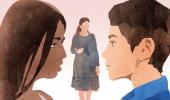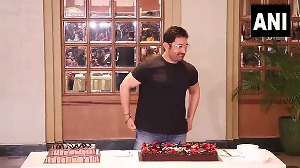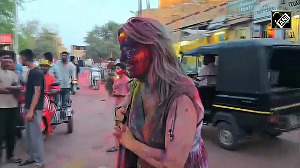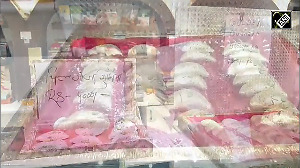Sometimes I run past a house where the owner has died. The children are abroad. The doors and windows are closed. That is the case with thousands of homes across Kerala.

On Sunday morning, I set out on a jog in a lane behind my house. The lane is usually deserted. There are trees on either side. There are many houses with gardens in front. A large building is also there.
It is quiet enough that I can hear the cawing of crows and the chirping of sparrows. Of course, to listen to these sounds, I have to quieten the crashing sound of colliding thoughts in my head -- happy moments, sad recollections, angry exclamations, revengeful desires, and nostalgic situations.
I often saw a thin man clad in a banian and a dhoti. He had grey hair and large eyes. He lived in a house in that lane. Sometimes, I smiled. He waved. Or he would say, 'Good morning.'
I would squeeze out some sound because I was breathing hard through my mouth. But we had no conversations at all. Neither did I know his name, nor did he know mine. It was a 'Hi and bye' acquaintance.
Then a couple of months ago, I realised he no longer came for his morning walk.
What happened? Had he become ill? Has he been struck by a stroke and is bedridden? Is he suffering from dementia? Or has he passed away? Or a more comfortable thought: He might have gone for a long vacation.
Whatever the reason, I could knock on the door of his house and find out. But somehow, I haven't.
I am afraid to know the answer. And I prefer to remember him as I had seen him, with a pleasant smile and a gentle wave of the hand.
For many years, I would see a middle-aged man and woman go for a morning walk. He was tall and bespectacled. She reached his shoulders. But she always spoke animatedly, always moving her hands. And he listened with an occasional nod of his head. Then one day, he began walking alone...
One morning, someone put up a flex board on a pole announcing a death. A lady has passed away. She was 63. A group of women stand near it. One of them said, 'Do you know who she is?'
And yes, one woman knows and explains.
When I look at the photo, I realise I don't know her. Neither do I remember having ever seen her. Yet, she stayed nearby. This is city life. People live in their bubbles.
There have been other deaths in our lane. A 60-year-old man, who had spent decades in the United Arab Emirates, returned. He was all set to spend the rest of his years with his wife and family.
But one morning he collapsed in the bathroom following a heart attack and passed away. The devastated wife placed her head on the lap of her daughter. The son shed tears. Neighbours came and offered their condolences.
Many who lived in the lane did not know them personally. But at this moment of tragedy, they felt the need to offer solace.
In a quiet lane, life-shattering events were taking place.
There is also silent suffering. A widow lives all alone. Children are away. Visitors are rare. Only the maid comes to cook and clean the floors. Her company is a TV set, and walls and windows.
Sometimes I run past a house where the owner has died. The children are abroad. The doors and windows are closed. That is the case with thousands of homes across Kerala.
The Malayalis want to leave because of dismal job opportunities. And the people from other states, especially labour, want to come here because of good daily wages.
What a paradox!
On a recent morning, it is cloudy. A gentle breeze blew. I inhale deeply. I had reasons to be grateful for this fresh air.
In Delhi, during Diwali, the Air Quality Index was 330, while in Kochi it was 60.
By this time, the dopamine has been released in my brain. My mood becomes lighter. I feel calmer.
And I am grateful to be alive.
Feature Presentation: Rajesh Alva/Rediff.com











 © 2025
© 2025